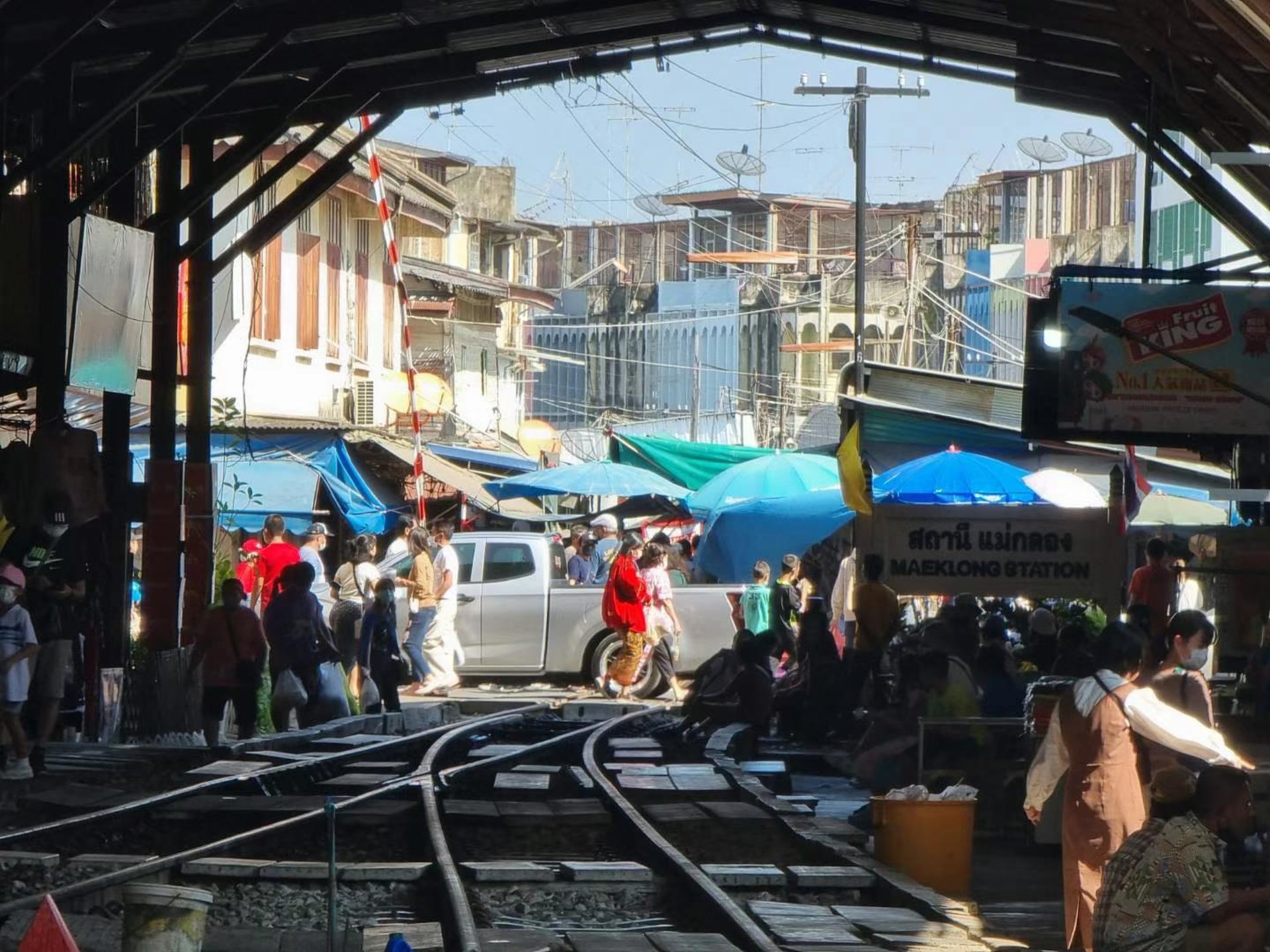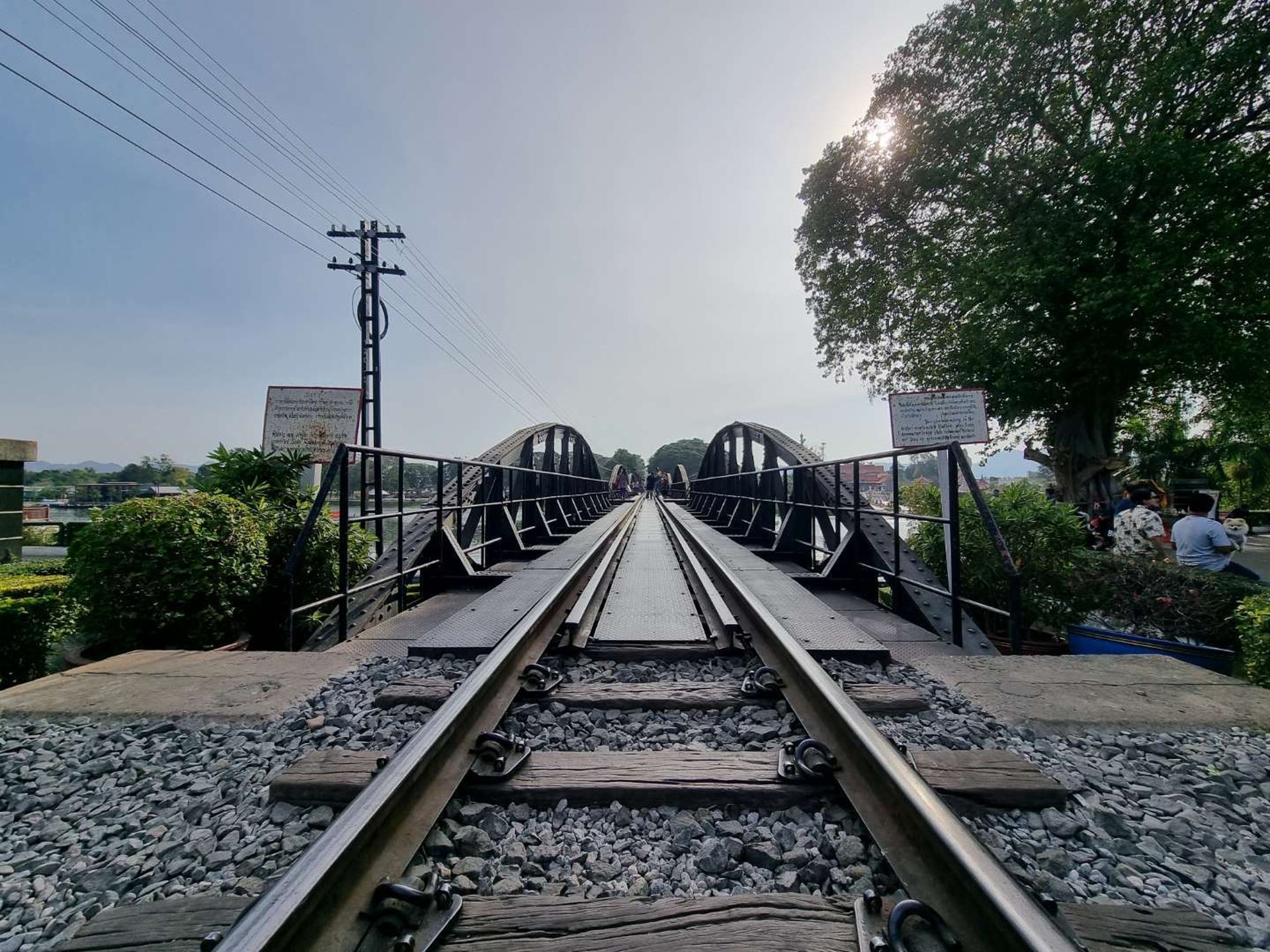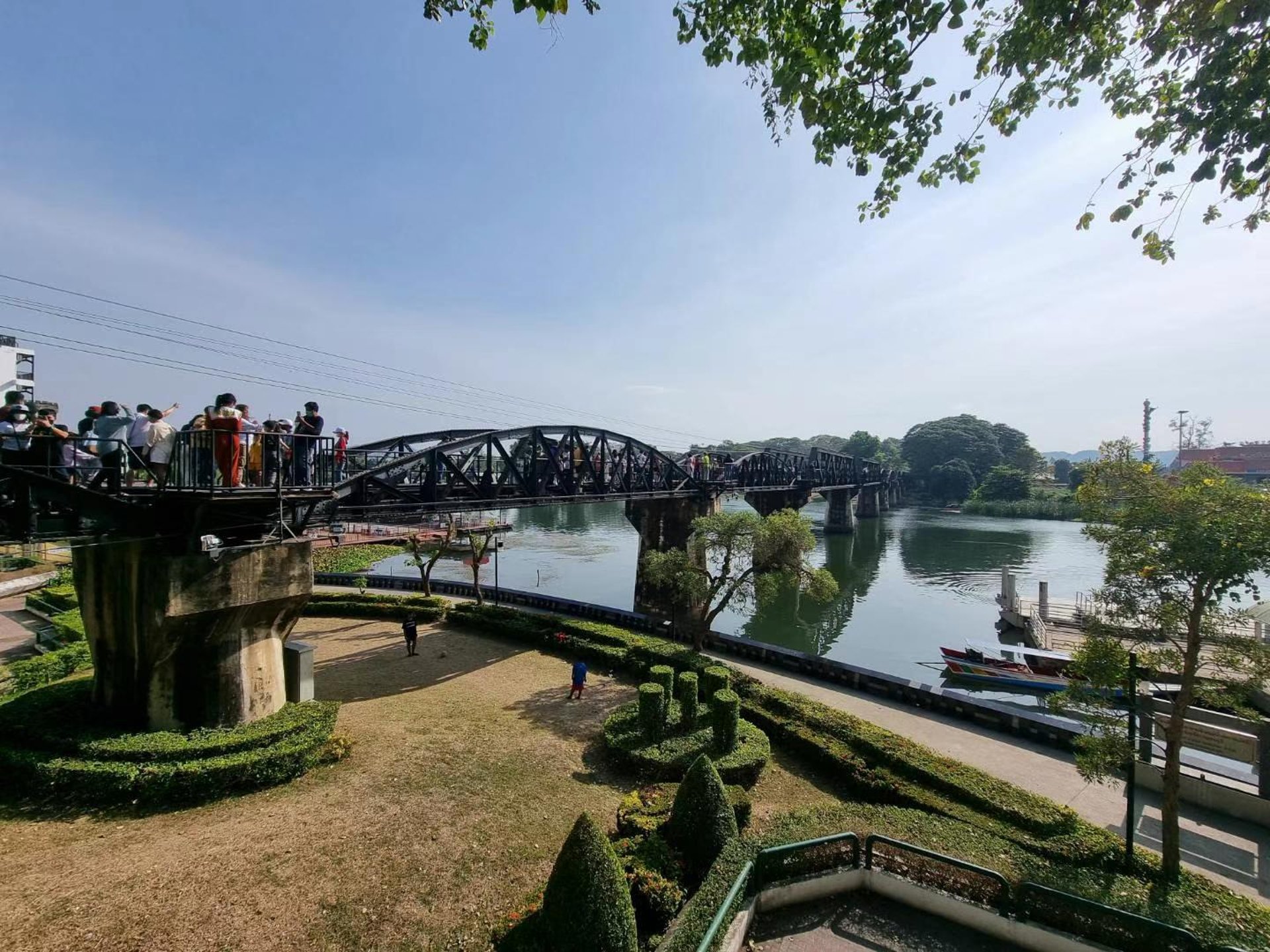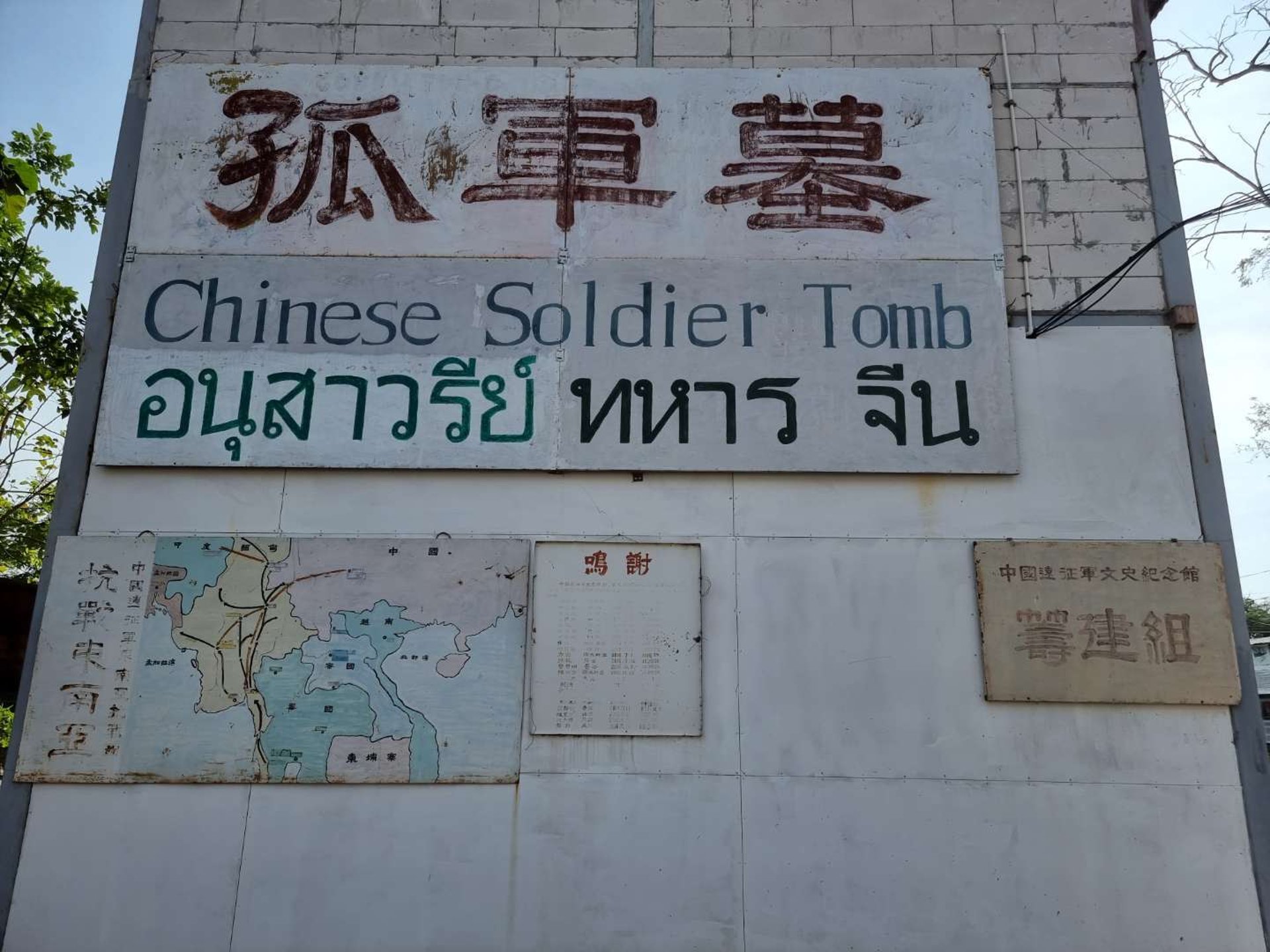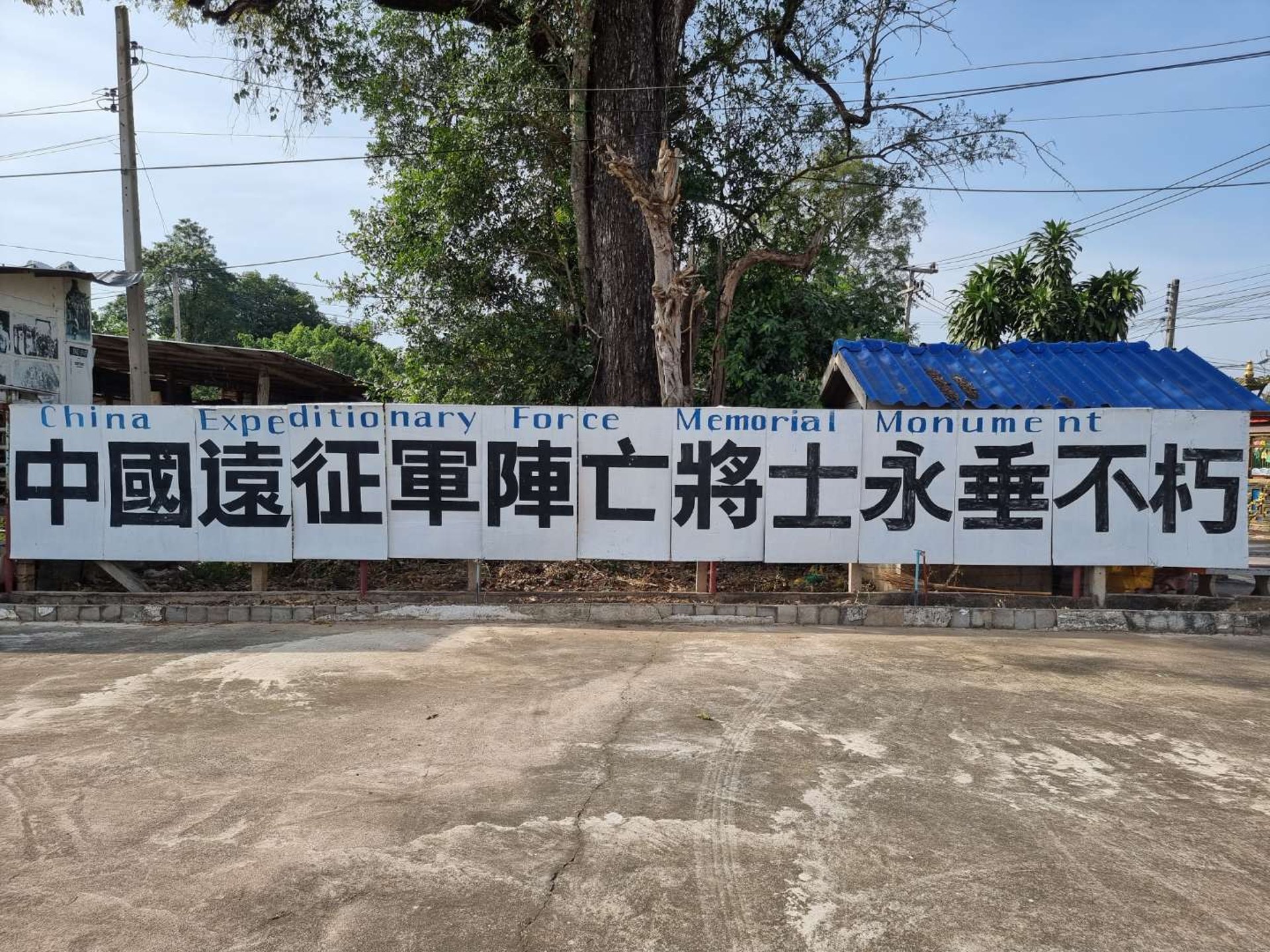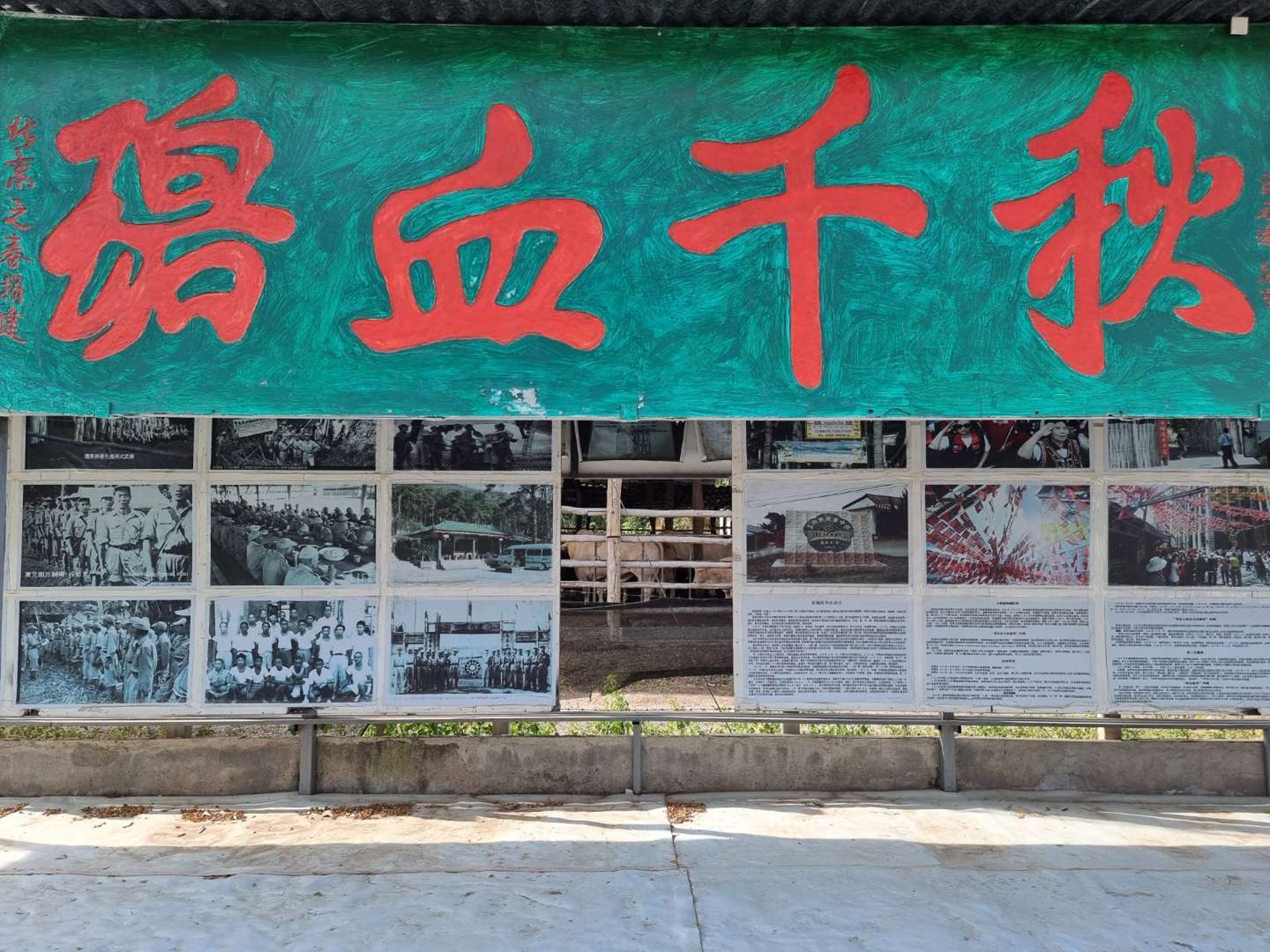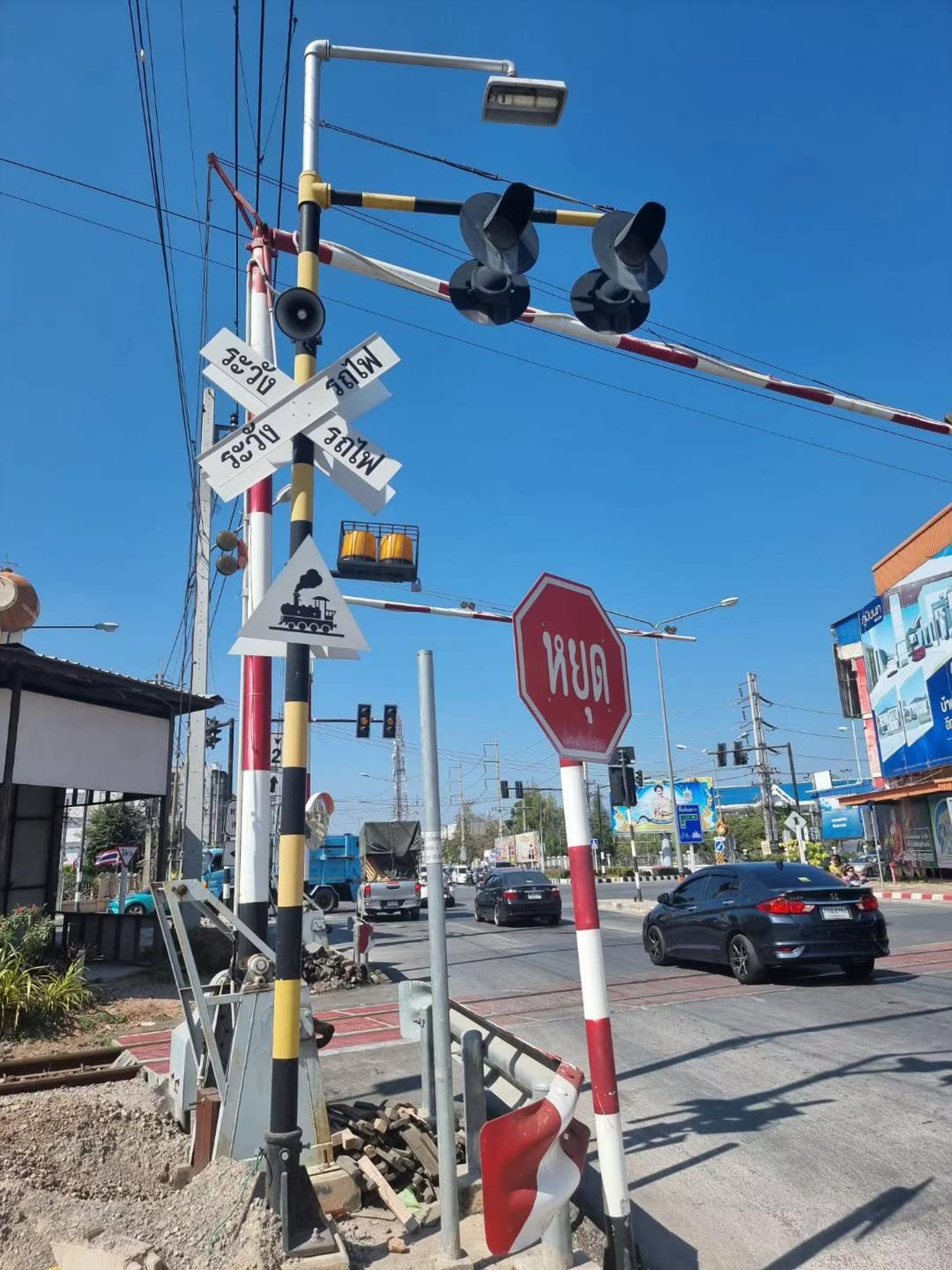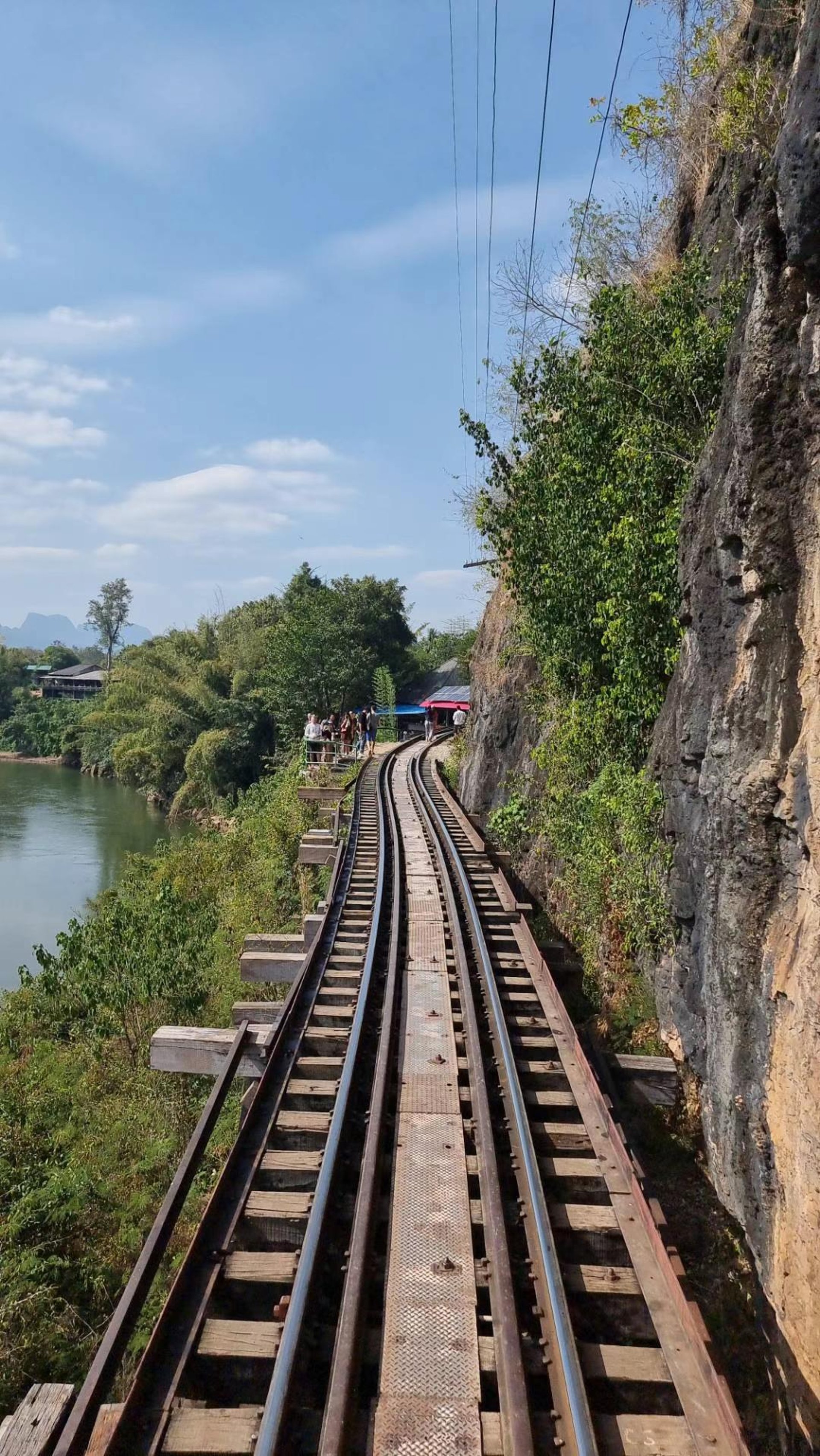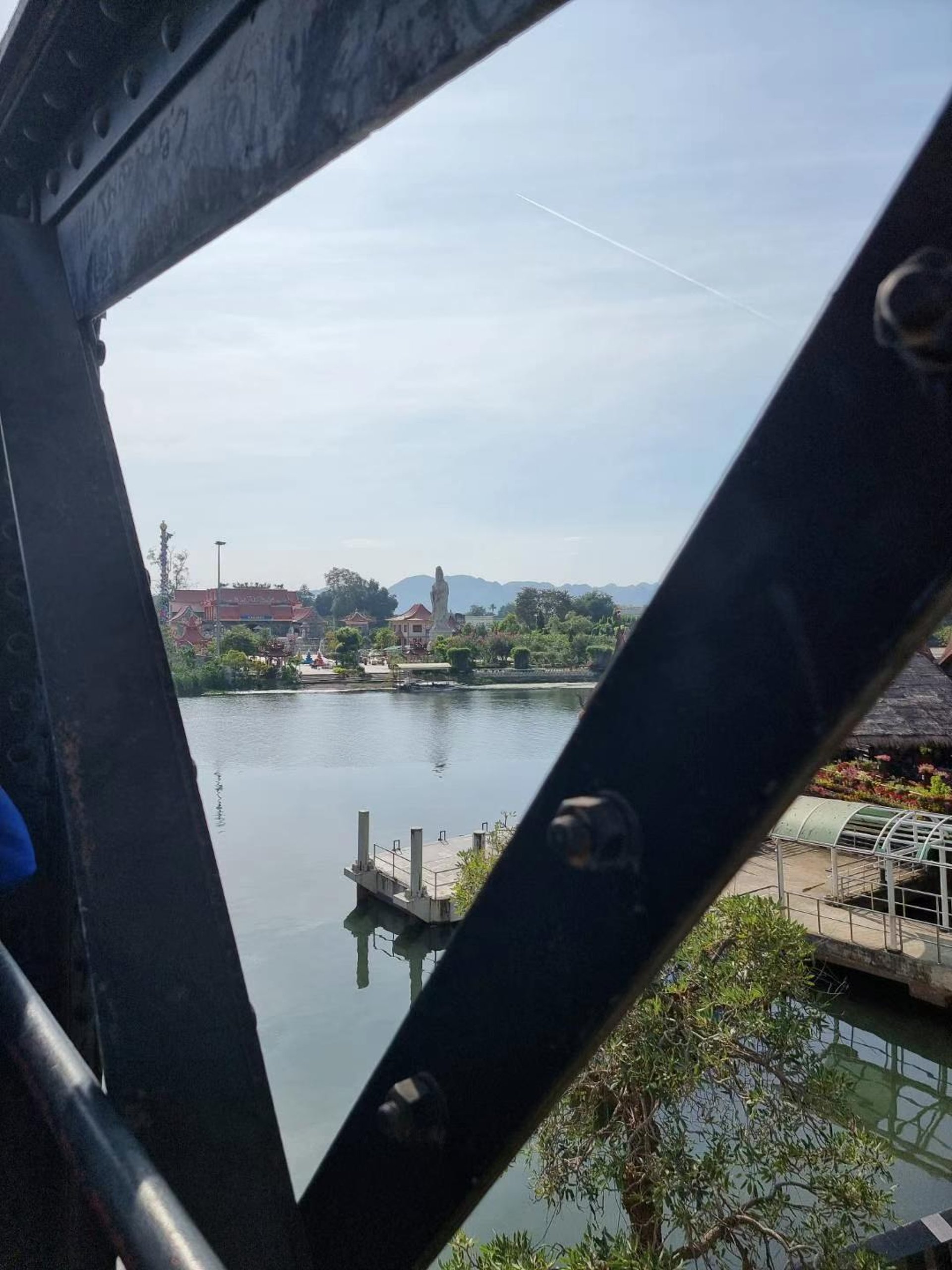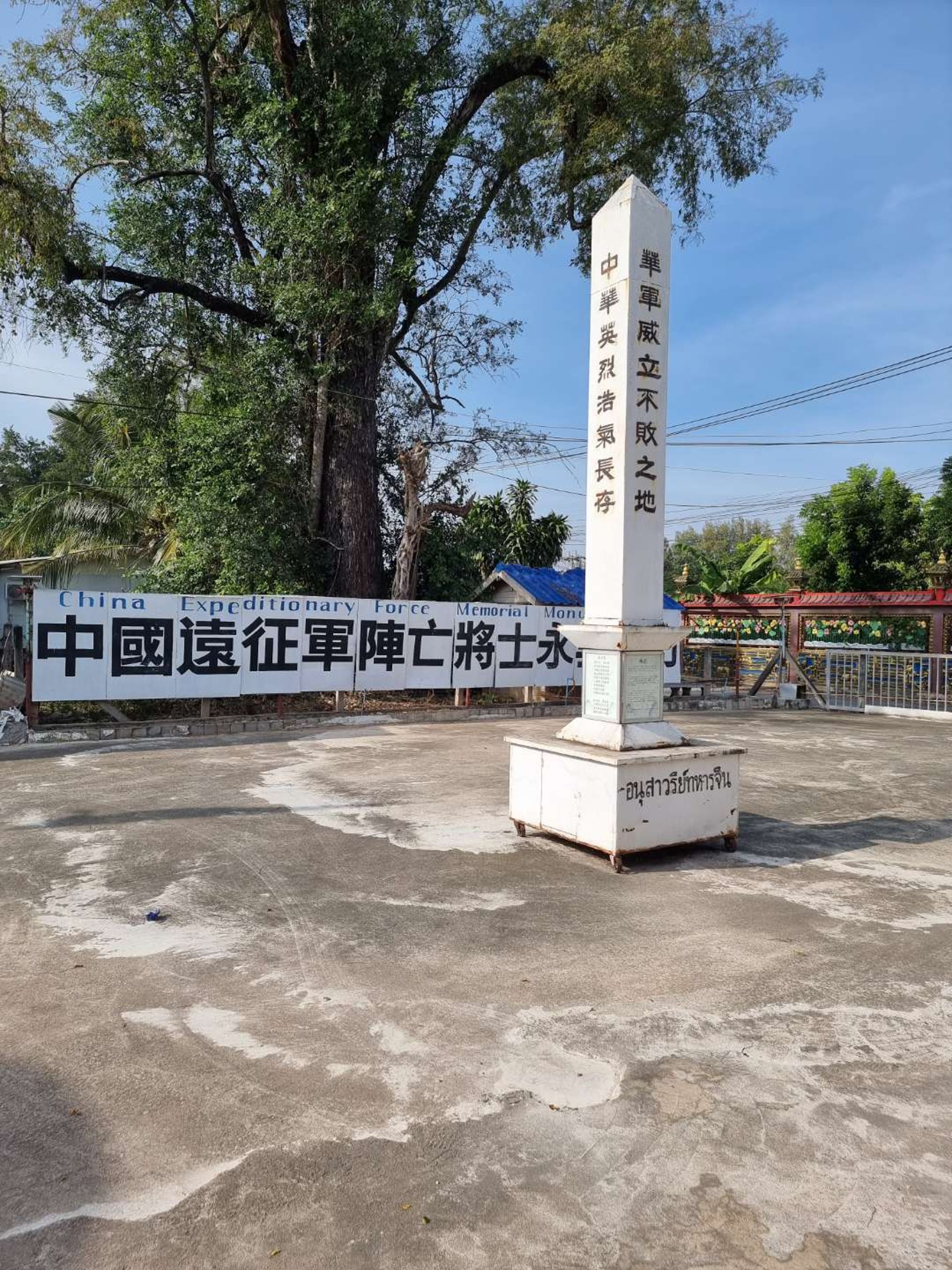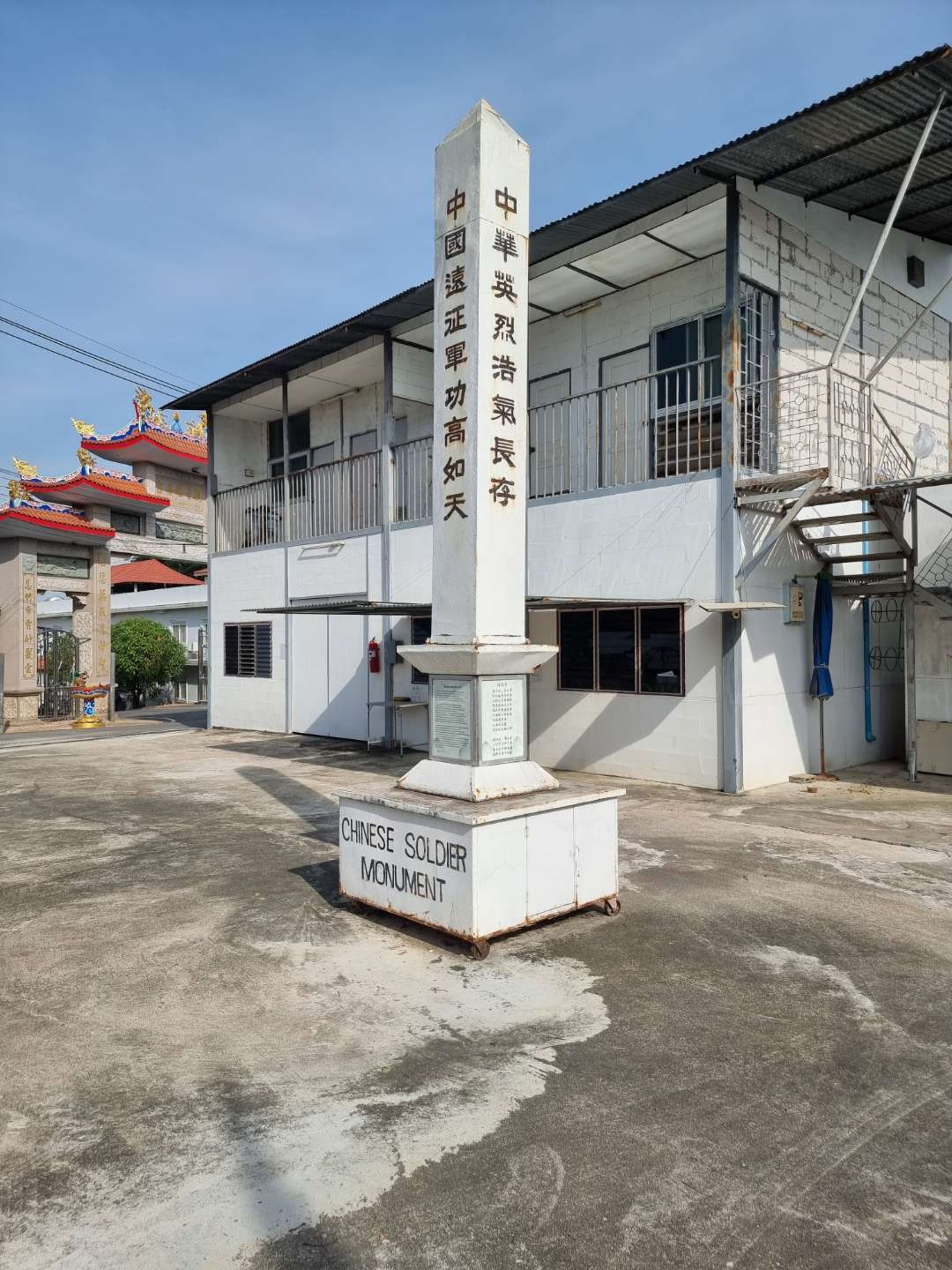Thoughts from the First Two Days of 2023: Attraction, Train and Identity
2023年第一日和第二日的笔记:旅游景点、火车铁路与身份认同
This blog is originally written in Chinese. The English translation may have slight differences from the original text.
2023年的前两天都在曼谷周边的府的day trip的舟车劳顿中度过。I spent the first two days of 2023 on day trips to the provinces near Bangkok.1日是Samut Songkhram府的铁路市场,是连接Samut Songkhram府的Mae Klong和Samut Sakhon府的Ban Laem的铁路。比起许多人童年回忆里镰仓的海边铁路的小清新,泰国的这处和其他景点都挤满了游客。这处被开放的景点实际是该铁路的尾端,从与大路的交叉口进入一路走过两侧的店铺逐渐从有英文和华文菜单的café、千篇一律的纪念品商店变成菜市、鱼贩和本地人的住家。市镇的兴起是因为铁路,而土地私有化则使得这些紧挨着铁路的店铺和住宅得以保留。
On 1st Jan, I visited the railway market in Samut Songkhram. The railway connects Mae Klong, Samut Songkhram and Ban Laem, Samut Sakhon. Lots of (Chinese) people think of the seaside railway in Kamakura, Japan when they think of railway, but here was full of tourists just like any other part in Thailand. This so-called attraction is actually the terminus of the Mae Klong - Ban Laem railway. Through the entrance what come into eyesight first are cafés with English and Chinese menu and souvenir shops selling the same mass-produced goods; after some mileage, they are replaced by wet market stalls selling fresh produces and catches, stinking marinated fish and shrimps and houses of local residents. Railway brought prosperity to towns, and private land ownership allows the preservation of those buildings which are just inches away from the track.
我想到我的故乡,我的故乡是一个新近才被擢升的铁路枢纽,而在我少时并不发达,所以在我离家求学之前一次也没有乘搭过火车。新修建的气派的高铁远离市区,而铁轨旁留着宽阔的隔离缓冲带,远离建筑和道路。比起这种现代而冰冷的铁路,我更喜欢欧洲的火车站,由于历史的原因大多都位处城市核心区域,无安检无闸机也让乘车要提前的时间缩至十分钟之内,对旅行者来说没有比这更方便的了。
My hometown was not developed until it became a major railway hub recently, and I did not even take train for once before I left for university study. The newly built railway station is large and far away from the old city area, further separated by buffer zone from roads and buildings. I prefer railway stations in Europe: they are located right in the centre of cities and towns, are open to everyone and the lead time can be as short as a few minutes, which provide great convenience for tourists.
当然铁路最重要的功能还是运输。在Mae Klong终点站依然有大量的泰国人提着大包小包等着下一班火车,全然无视在铁轨上凹造型的IG网美和小红书博主们。在我不能免俗地像其他游客一样举起手机录下火车经过的视频时,车上的泰国人对我的镜头挥手微笑,而车上的游客们回敬的是同样黑洞洞的摄像头。那一刻我有些恍惚,我作为一个车外的游客与车上的游客发生了交集,我同时是观察者和被观察者,而数分钟后观察者和被观察者的视角都会被上载到社交平台,在同一个定位tag下被找到。我有时会想,这些群体性的同质化的可复刻的记录,除了为博看客一笑点赞爱心之外还有什么意义呢?现代的社交媒体从FB到TikTok开始占用越来越多的记忆体空间,个人设备生产商们也不得不提供更多的记忆体空间,有朝一日地球资源枯竭时人类环顾四周会不会发现自己已经被硅片包围?而若干时间后(我不用世纪和纪元,因为时间跨度已经超越这些由人类定义的单位)外星人(如果存在)发现的地球上是不是已经只是一片硅片的坟场?
Railway, after all, is a mean of transport. This railway is still operating today, and many Thai people are waiting patiently for their train with their luggage, ignoring Instagrammers and Xiao Hong Shu-ers posing on the track for photos. Fear of missing out, I captured the moment the train rode past me like everyone else, and the passengers on the train, including tourists and Thais, waved and smiled to me, confronting our lenses with theirs. I felt puzzled at that specific moment: I, as a tourist, outside carriages, interacted with tourists inside carriages, became both observer and observee; and moments later, videos coming from both angles would be uploaded to social media sites, found under the same hashtag. What meaning do those shared, generic, indistinctive, duplicable experience being shared possess other than attracting likes on social media? Evolving from Facebook to TikTok, social media are occupying more and more storage space, phone manufacturers have to provide more storage capacity in response. But one day this is going to an end when human exhaust all the resources on Earth, and when they look around they will find themselves surrounded by the stretching mountains of silicon chips. Long after (century and era are too short for this), would aliens (if they do exist) find Earth a graveyard of silicon?
以旅游业为支柱的泰国显然不会放过任何一个可以开放的旅游资源,而旅游资源的过度开发引来了大量的游客,虽然似乎泰国人对此并未表现出不满,似乎这跟二战中同盟战后又吸收大量投资和产业转移的日本人有些相似。虽然曼谷终日拥堵、吵闹、乱糟糟,但曼谷有一点我喜欢的是它的包容。越南河内也有类似的Train Street,只是在我到访时被酒店告知已经被政府以影响市容为由关闭,虽然不久后我就看到了其他人的视频依旧火车照跑游客照跳。
Being a pillar of its economy, Thailand would not spare a potential attraction site untouched. Excessive number of tourists flocking to Thailand due to overdevelopment of tourism doesn't seem to bother the locals, in which sense Thais behave like the Japanese whom they allied with in WWII, and after received investments and relocations of manufacturing industry from. Bangkok may be jammed and noisy all day, but one thing I like about Bangkok is its inclusiveness. There is a famous "Train Street" in Hanoi, Vietnam but when I was there I was told by my hotel concierge that the local government had shut it down, though shortly after I saw new posts of it.
这慢悠悠的通勤火车显然不能与飞驰的高铁相比,却是当地人重要的通勤方式,因为票价低廉。想到许多peer第一次去纽约出了JFK机场打Uber进城被曼哈顿的堵车和几百刀的账单吓到,而我选择AirTrain到Jamaica换车全程不到十刀就有些洋洋得意。从火车被发明开始就是为了实现快速的高运量运输,而火车至今在绝大多数地区都是一种平价环保的交通工具。我想到在奥铁ÖBB购票,网页上会显示本次旅行的碳排放量。虽然受困于时间和班次很多时候我还是选择了贵得多的飞机,但我认同铁路环保的理念,只是欧洲大陆的铁路能再快一点就好了。
This railway, albeit nowhere near Shinkansen, is an important mode of commute for the locals given the price. Many of my schoolmates who went to the US for exchange took cab or Uber when they landed in New York, and were caught in notorious traffic jam in Manhattan and later shocked to see the final bill amount up to some hundreds, whereas I took the local train and the whole journey cost less than $10. Railway was invented as a mode of transport of high speed and capacity, and it remains as a cheap ride in most parts of the world. When I purchase ticket on Austrian national railway operator ÖBB website, it tells me the carbon emission for my trip. I like railway being a more eco-friendly way of transport, just hope it was faster in Europe so I didn't have to purchase expensive air tickets for my compacted itinerary.
本日的导游是泰国第二代华人,华语名叫夏庆国,家庭从马来西亚槟城移居而来。车开了一路他讲了一路,我注意到他展示出的特性:他介绍泰国时说“我们泰国”多少个府人口几何,却又在饮食习惯上描述“他们泰国人”口味重高盐的鱼露高脂肪的椰浆使用过多以及嗜甜摄入含糖饮料过多。我想到海外华人的一个奇异的处境:许多华人移民后代依然无法在文化上完全融入所在国。我到马来西亚槟城,虽然大众书局里的国语区指的是马来文书籍而不是(台湾)华语,但槟城可以算是整个新马地区华人精神故乡,孙中山也曾在此起事,而槟城也是马来西亚现今唯一的华人占多数的州属。大马华人同时也是小红书的重度用户。虽然在描述时我又不可避免地犯了大一统史观的错误,用华人这个包括了受汉族文明辐射影响的边陲地区的少数民族的概念来指代主要以汉族为主体,祖籍两广、福建、海南的移民。由于两岸政体和文化的分歧,许多海外华人对想象中的母国也有认知问题。2015年我在越南西贡的一日团里遇到一位越南华人,他连连称赞总书记的执政路线。我有一位出生在台湾的马来西亚籍同事,家中两个弟弟妹妹一个去了北京的清华一个去了台北的清华。
The tour guide is second-generation Chinese, whose parents migrated from Penang, Malaysia. I noticed conflicts within his speech: when he spoke about demographic information of Thailand, he would use "Our Thailand..."; on the other hand, he would say "they the Thai people" are addicted to sweet drinks high in sugar, fish sauce high in salt and coconut milk high in fat. This reminded me the situation ethnic Chinese are in: many are still not fully assimilated to the countries where they live in and sticking to Chinese culture. Penang is regarded as the utopic homeland of ethnic Chinese in South East Asia, (though in book shops "national language" refers to Malay language), is where Mr Sun Yat-sen got his support from Malayan Chinese, and the only state in Malaysia where the majority of population is Chinese today. Chinese Malaysians, are also heavy users of Chinese social platform Xiao Hong Shu. The term "Chinese" in Chinese language is over-generalised and heavily influenced by the perspective of Han Chinese, which (in this context) actually refers to Han Chinese migrants mainly of Canton, Hokkien and Hainan origins. The difference in the form of government and culture between China and Taiwan leads to divergent imaginations of the motherland of those immigrants. I met a Chinese Vietnamese in 2015 and he spoke highly of the leadership by Chinese President Xi. My ex-colleague, who was born in Taiwan and migrated to Malaysia with families, has a younger brother who studied at Tsinghua University in China, and a younger sister who studied at National Tsing Hua University in Taiwan.
2日则是去Kanchanaburi北碧府的泰缅铁路。铁路因1957年拍摄的电影《桂河大桥》而闻名,据说是在当时的(引进电影寥寥的)中国人人看过的电影,这对我来说显然年代太久远,那段日后被广泛引用的口哨声倒是有些印象。我对这段历史并不十分感兴趣,搜了一下网路上的游记,决定探访附近的中国远征军纪念碑。
On 2nd Jan, I visited the Burma Railway, commonly known as the "Death Railway". It's famous for the film The Bridge on the River Kwai (1957), which was reportedly a shared memory of mainland Chinese of that generation (as supply of films was extremely limited back then). I have never watched it; it simply does not beyond to my generation. The melody of whistle which is later used by many films does ring a bell to me. This part of history didn't really interest me, and I decided to visit the Chinese Soldiers' Memorial nearby after reading online reviews.
重修的狭窄的铁路桥上挤满了拍照凹造型的泰国人和外国人,一路抱歉赔笑穿过人群,纪念碑位于一座安静的观音寺的后面。纪念碑是一位曾从军而在那场春夏之交的风波后逃亡到泰国的大陆人所设。罗大佑有一首歌『亞細亞的孤兒』,被许多人认为是暗喻当年被逐出联合国举目四望的台湾,虽然罗大佑本人澄清歌词是指泰北的孤军。泰北孤军的故事则比中国远征军更为坎坷而不为人所知,而被遗忘的他们被一位来自对岸的流亡者立碑,不禁让人唏嘘国军政府的冷漠。
The memorial is located at the quieter side of the river, across the rebuilt Kwai River Bridge full of people. I probably said "excuse me" a thousand times cutting through the crowd. The memorial was located behind a quiet temple of Guan Yin, set up by a mainlander fled from China after Tian'anmen massacre. The song "The Orphan of Asia" by Taiwanese singer Lo Ta-yo, is commonly regarded as an implicit metaphoric reference to Taiwan, after its seat in the United Nations being taken by China (PRC). The singer himself, has denied such speculations and insists that the song is referring to the Yunnan Anti-communist National Salvation Army by Kuomingtang (KMT), which received even less attention than the Chinese Expeditionary Force in WWII. The forgotten army by KMT got memorised by a mainlander, what an irony.
也许在泰缅铁路旁立一块缅甸远征军的碑恰如其分吧,火车在闽南语里的发音声似“回家”,在被人忘却这么多年后,也许他们的亡灵终于可以回家了吧。
It couldn't be more appropriate to have a memorial for them. The pronunciation of the word "train" in Hokkien sounds like "coming back home" in Mandarin. After ages of oblivion, finally ghosts of soldiers can come back home.

